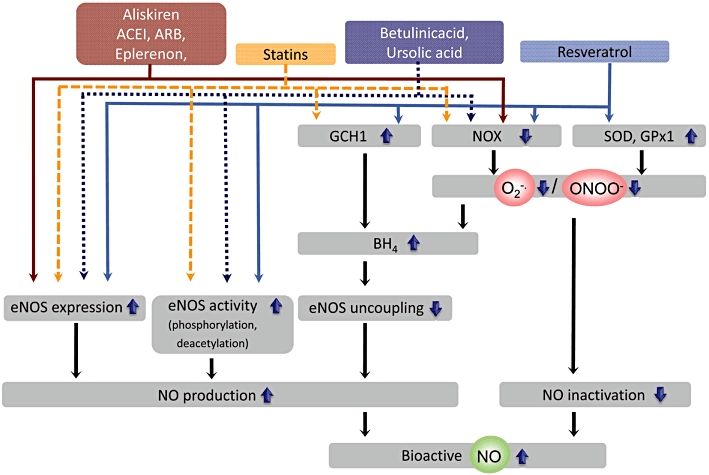Figure 2.

Therapeutic effects of enhancing endothelial nitric oxide synthase (eNOS) expression and preventing eNOS uncoupling. The renin inhibitor aliskiren, angiotensin-converting enzyme inhibitors (ACEI), angiotensin II receptor 1 blockers (ARB), as well as the selective aldosterone antagonist eplerenone enhance the expression of eNOS. In addition, these drugs prevent eNOS uncoupling by downregulating nicotinamide adenine dinucleotide phosphate oxidase (NOX) expression and activity, and by preventing (6R-)5,6,7,8-tetrahydrobiopterin (BH4) oxidation (see text). Statins (3-hydroxy-3-methylgulutaryl-coenzyme A [HMG-CoA] reductase inhibitors) stabilize eNOS mRNA, downregulate NOX and increase BH4 biosynthesis by upregulating GTP cyclohydrolase 1 (GCH1). Betulinic acid and ursolic acid are compounds that enhance eNOS expression and, at the same time, downregulate NOX expression. Trans-resveratrol stimulates the expression of eNOS. It also enhances enzyme activity by increasing phosphorylation at serine 1177 and by activating the protein deacetylase SIRT1, which in turn deacetylates eNOS at lysines 496 and 506 (in the calmodulin-binding domain), thereby stimulating eNOS activity. In addition, it upregulates antioxidant enzymes (such as superoxide dismutases (SOD) and glutathione peroxidase 1 (GPx1) and downregulates NOX. This leads to a reduction of peroxynitrite (ONOO-)-mediated BH4 oxidation and NO inactivation by superoxide O2-·. Trans-resveratrol also stimulates the expression of GCH1. The enhanced nitric oxide (NO) bioactivity resulting from increased NO production and reduced NO inactivation is likely to mediate/contribute to the vasoprotective effects of the aforementioned compounds.
